| Amor | ||||
|---|---|---|---|---|
 | ||||
| Studio album by | ||||
| Released | 1982 | |||
| Label | CBS | |||
| Julio Iglesias chronology | ||||
| ||||
Amor is a 1982 CBS album by Julio Iglesias. It charted in the UK at No. 14 in 1983. [1] [2]
| Amor | ||||
|---|---|---|---|---|
 | ||||
| Studio album by | ||||
| Released | 1982 | |||
| Label | CBS | |||
| Julio Iglesias chronology | ||||
| ||||
Amor is a 1982 CBS album by Julio Iglesias. It charted in the UK at No. 14 in 1983. [1] [2]
| Region | Certification | Certified units/sales |
|---|---|---|
| United Kingdom (BPI) [3] | Gold | 100,000^ |
^ Shipments figures based on certification alone. | ||
Norman Newell was an English record producer and lyricist, who was mainly active in the 1950s and 1960s. He was also the co-writer of many notable songs. As an A&R manager for EMI, he worked with musicians such as Shirley Bassey, Dalida, Claude François, Vera Lynn, Russ Conway, Bette Midler, Judy Garland, Petula Clark, Jake Thackray, Malcolm Roberts, Bobby Crush and Peter and Gordon.
"Begin the Beguine" is a popular song written by Cole Porter. Porter composed the song during a 1935 Pacific cruise aboard the Cunard ocean liner Franconia from Kalabahi, Indonesia, to Fiji. In October 1935, it was introduced by June Knight in the Broadway musical Jubilee, produced at the Imperial Theatre in New York City.
Evangelina Sobredo Galanes, known as Cecilia, was a Spanish singer-songwriter. She took her stage name from the song "Cecilia" by Simon and Garfunkel.
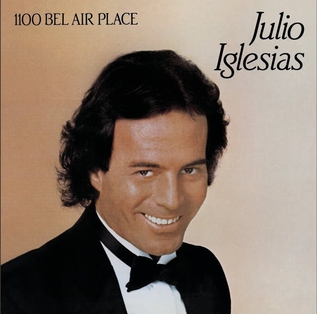
1100 Bel Air Place is a concept album of love songs largely composed by Albert Hammond, and performed by Spanish singer Julio Iglesias, released on 10 August 1984 by CBS Records internationally and by Columbia Records in the United States. It was the first of Iglesias' albums to be performed largely in English, and it is generally considered his breakthrough album in English-speaking markets.
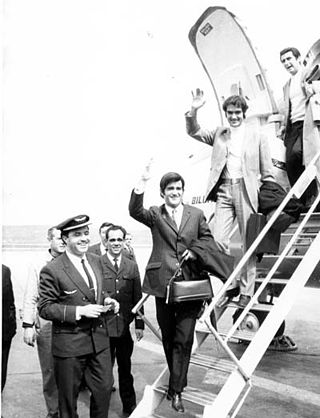
Dúo Dinámico is a Spanish pop music duo formed by Manuel de la Calva and Ramón Arcusa. Besides singers, they are songwriters and record producers and they starred in four feature films. They were the main precursors of pop music and fandom in Spain and were very popular in the 1960s.

En Vivo: Juntos Por Última Vez is the twelfth album by Mexican singer Alejandro Fernández. Recorded live in concert with his father Vicente Fernández, it concluded their extensive tour that took them throughout Latin America. The final concert that lasted more than five hours was held at the Foro Sol in Mexico City which housed over 60,000 people.

México >> Madrid: En Directo y Sin Escalas is the fourteenth album recorded by Mexican singer Alejandro Fernández, a concert made on June 22, 2005, in "El Nuevo Palacio de Congresos" in Madrid, Spain. A spectacular production that counted on the participation of more than 28 musicians in which Alejandro interpreted his biggest successes. Some of the most outstanding moments were the duets with Amaia Montero, the Spanish singer Malú and Diego "El Cigala". In words of the same Alejandro: "An unforgettable, very intimate, magical and special concert".

"Lo Mejor de Tu Vida" is a ballad written and produced by Spanish singer-songwriter Manuel Alejandro, co-written by Marian Beigbeder, and performed by Spanish singer Julio Iglesias. It was released as the first single from his studio album Un hombre solo (1987). The song became the first by a male performer to spend 13 weeks at number one in the Billboard Hot Latin Tracks chart and held the record for the biggest leap to the top of the chart for over twenty years until Mexican rock band Maná leapt from 22 to number one with "Manda Una Señal" in 2007.
"Que No Se Rompa la Noche" literally "May the Night not Break", is a ballad written and produced by Spanish singer-songwriter Manuel Alejandro, co-written by Ana Magdalena, and performed by Spanish singer Julio Iglesias. It was released as the second single from his studio album Un hombre solo (1987). This song became his second number one hit in the Billboard Hot Latin Tracks chart, after his previous single "Lo Mejor de Tu Vida".

La Carretera (The Road) is a studio album by Julio Iglesias. It was released in 1995. It was nominated for Pop Album of the Year at the Lo Nuestro Awards of 1996. Portuguese edition named "A Estrada", and France edition named "Vers la frontiere", and Italian edition named "Su questa strada".
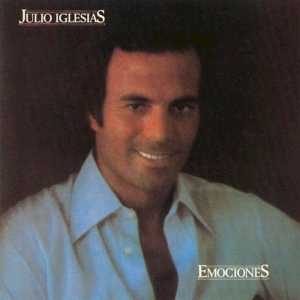
Emociones is a 1978 album by Spanish singer Julio Iglesias.
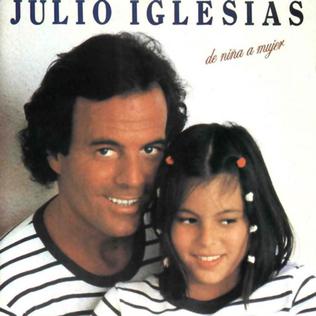
De Niña a Mujer is a 1981 album by Julio Iglesias. The album was his first Spanish-language album to be released in the United States by Columbia Records to capitalize on the singer's rising popularity. The American version was retitled "From a Child to a Woman" and released simultaneously with the original Discos CBS version. The album, as its title implies, was dedicated to his daughter Chabeli, who is featured on the album's cover alongside her dad.
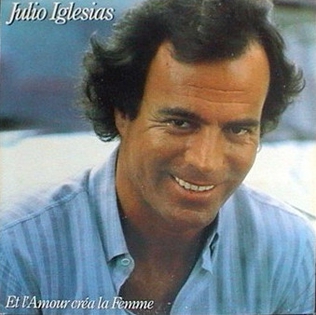
Et l'amour créa la femme is a 1982 album by Julio Iglesias.

Momenti is a 1982 album by Julio Iglesias recorded in Italian. Music arranged by Ramón Arcusa and Rafael Ferro. Italian lyrics by Gianni Belfiore. In 1985 it was reported by the Canadian Recording Industry Assn. (CRIA) that Antonio Crispino was tried following a police investigation into the ordering and distribution of counterfeit copies of Momenti.

Sono un pirata, sono un signore is a 1978 album by Julio Iglesias. The album, his first in Italian, was particularly successful in Italy and marked the start of major success for the Spanish singer in Italy. The album contains two of his most famous songs in Italy, namely "Pensami" and "Sono un pirata, sono un signore".

Momentos (Moments) is a 1982 album by Julio Iglesias. By 1984, the album sold over 1 million copies in Brazil. With sales of over 12 million, it is believed to be the best-selling Latin album of all-time.
This article includes an overview of the major events and trends in Latin music in the 1980s, namely in Ibero-America. This includes recordings, festivals, award ceremonies, births and deaths of Latin music artists, and the rise and fall of various subgenres in Latin music from 1980 to 1989.

"Agua Dulce, Agua Salá" is a song from Spanish singer Julio Iglesias's studio album La Carretera (1995). The song was written by Estéfano, Donato Poveda, and Hal Batt and produced by Ramón Arcusa. It was released as the lead single from the album in 1995. A rumba flamenca, the song deals with the theme of life. The song received positive reactions from music critics, mostly being found catchy by them. It was a recipient of the ASCAP Latin Award in 1996. Commercially, the song peaked at number three on the Hot Latin Songs chart and number one on the Latin Pop Airplay chart in the United States. A music video for the song was filmed in Spain and features Fabiola Martinez. Iglesias also recorded it in Portuguese as "Água Doce, Água do Mar" for his studio album Ao Meu Brasil (2000).
This article includes an overview of the major events and trends in Latin music in the 1970s, namely in Ibero-America. This includes recordings, festivals, award ceremonies, births and deaths of Latin music artists, and the rise and fall of various subgenres in Latin music from 1970 to 1979.